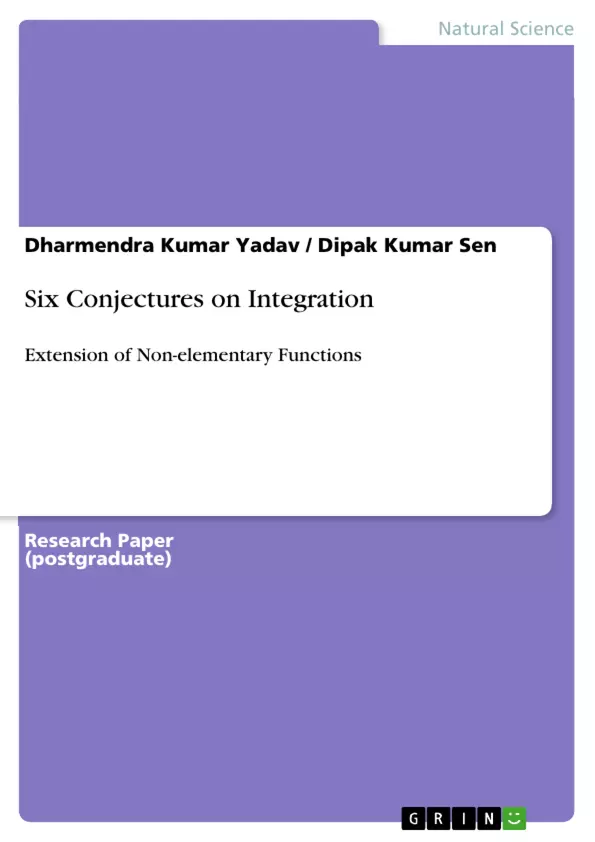In this book, six conjectures on non-elementary functions based on indefinite integrals have been introduced. These conjectures give an infinite number of non-elementary functions in the sense that they cannot be integrated because for them no anti-derivatives exist in the form of elementary functions.
These functions behave like a super set of many traditional non-elementary functions as can be seen in the examples on each conjecture. Two examples discussed by Marchisotto & Zakeri and the strong Liouville's theorem played an important role in proving each conjecture and its associated examples. These conjectures open up many more problems in the field of integral calculus for further research.
Frequently asked questions
What is the purpose of the Acknowledgement section?
The Acknowledgement section indicates that the book's content is derived from the author's doctoral thesis submitted in 2012 at Vinoba Bhave University, Hazaribag, Jharkhand, under the supervision of Dr. D. K. Sen. It acknowledges the previous publications of the thesis as e-books and explains the rationale for publishing the present book.
Who is the book Dedicated to?
The book is dedicated to the author's parents (Siri Yadav & Lalmuni Devi), wife (Sanju Kumari), and daughters (Palak & Phalak).
Who are the Heartiest Thanks extended to?
Heartiest thanks are extended to Dr. D. S. Lal, Dr. Arun Kumar, Dr. S. K. Aggarwal, Dr. A. Kumar, Dr. R. K. Dwivedi, Dr. P. K. Manjhi, Dr. S. K. Mishra, and Dr. Peeyush Tewari for their support during the author's doctoral research.
Who is the book Warmly Presented to?
The book is warmly presented to Dr. Shashi Nijhawan and various faculty members of the Department of Mathematics at Shivaji College, University of Delhi.
What chapters are included in this book?
The book includes the following chapters:
- 1. Introduction
- 2. Six Conjectures
What topics are discussed in the Introduction (Chapter 1)?
The Introduction covers topics including: Function and Elementary Function, Range and Difficulty of Problem of Indefinite Integration, Existence of Integrals and Lack of Notations, Algorithms on Elementary and Nonelementary Functions, and Strong Liouville's Theorem.
What does Conjecture-1 address?
Conjecture-1 addresses the indefinite integral of the form ∫ef(x)dx, where f(x) is a polynomial of degree 2, a trigonometric function, or a hyperbolic function. It postulates that such integrals are always nonelementary.
What did Gottfried Leibniz define?
Gottfried Leibniz defined an indefinite integration of an elementary function f(x) as a solution F(x), composed of elementary functions, such that F '(x) = f(x).
What is a nonelementary function?
Nonelementary functions are those whose indefinite integrals are neither elementary nor can be expressed in terms of elementary functions.
What does Liouville's First Theorem on Integration state?
Liouville's First Theorem on Integration states that if an algebraic function is integrable in finite terms, its anti-derivative is the finite sum of an algebraic function and the logarithms of algebraic functions.
What is the special case of strong Liouville's theorem?
The special case of strong Liouville's theorem states: If f(x) and g(x) are rational functions with g(x) non-constant, then ∫f(x)eg(x)dx is elementary if and only if there exists a rational function R(x) such that f(x) = R'(x) + R(x)g'(x).
What is Example 4 of strong Liouville's Theorem?
Integral e^(ax^2)*dx is nonelementary for n an integer, is non-elementary for 0 not equal to a .
What is Example 5 of strong Liouville's Theorem?
Integral e^(x^n)/(cx)dx. for n a positive integer and c a nonzero constant, is nonelementary.
- Quote paper
- Dharmendra Kumar Yadav (Author), Dipak Kumar Sen (Author), 2012, Six Conjectures on Integration, Munich, GRIN Verlag, https://www.grin.com/document/346616



